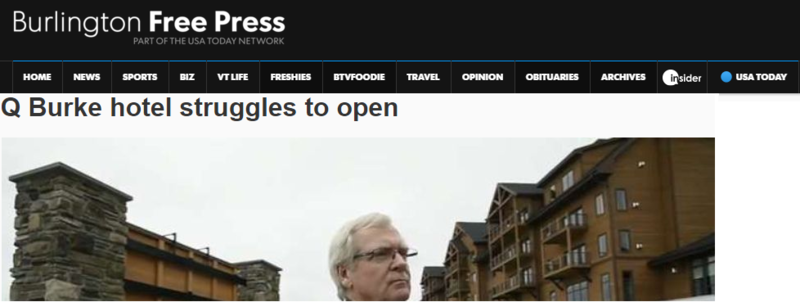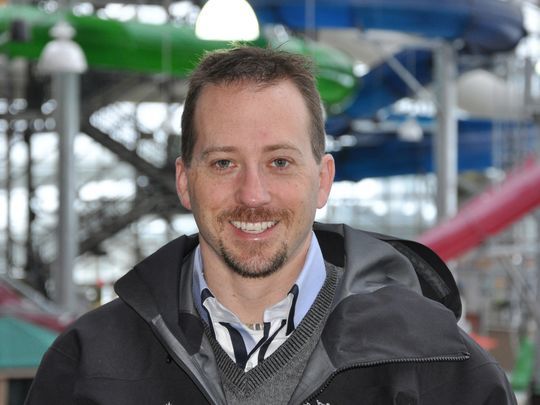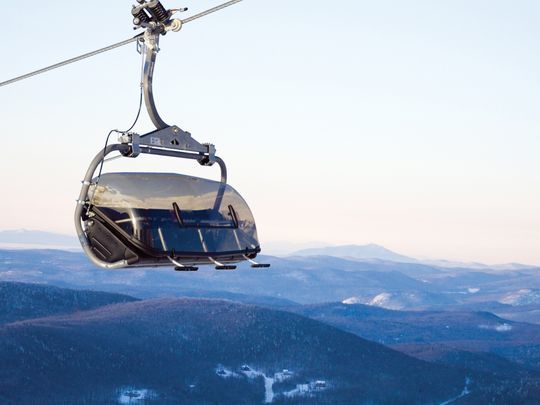Q Burke Hotel is finished, but General Partner Bill Stenger can't open it because the state is restricting funds raised from foreign investors to pay for the project
The beds are made in the 116 smartly appointed suites in the new $50 million Q Burke Hotel and Conference Center at the ski mountain here. In the hotel's restaurant, the tables are set with linen tablecloths and sparkling glassware. In the kitchen, the pilot lights are burning on the commercial Garland ovens, and in the hotel gym, the treadmills and weight machines are poised and ready for guests.
Even on a gloomy March day, with clouds shrouding the surrounding mountains, the view from the patio above the entrance to the hotel is a stunning 360-degree panorama. The winter was atrocious, but the ski runs on the hotel's doorstep still make the case that Q Burke is, as co-general partner Bill Stenger says, "the best hotel site in Vermont."
There's just one problem. The doors to the Q Burke Hotel are locked; the rooms, hallways and gathering places inside are eerily empty; and there is no guarantee right now when Stenger will be able to unlock those doors and welcome his first guests.
Stenger is in the middle of a months-long battle with the state Department of Financial Regulation and Agency of Commerce and Community Development to gain access to the funds he raised from foreign investors to pay for Q Burke. The state agencies took control of the money, originating from a federal program known as EB-5, several months after Stenger angered some of the investors in another of his EB-5 projects at Jay Peak Resort by unilaterally changing the terms of their repayment. Stenger is a general partner in both the project at Jay Peak and Q Burke with Ari Quiros, a Florida businessman.
Following the brouhaha at Jay Peak, the Agency of Commerce and Department of Financial Regulation began requiring Stenger to place the funds he was raising from foreign investors via the EB-5 program into escrow for his two current projects — Q Burke Hotel and Anc Bio VT, a biotech facility being built in Newport. The money was to stay there until the Department of Financial Regulation could complete a financial review of Stenger's operations. That was in July 2015. The review is still not complete. Stenger blames the state, saying he has provided hundreds of thousands of pages of documentation. The Department of Financial Regulation declined to comment on a pending review.
Caught in the middle is Jerry Davis, president and owner of PeakCM Construction in Winooski, who has built many projects for Jay Peak, both as president of his own company and previously as a senior project manager for DEW Construction Corporation in Williston. While Stenger and the state argued over how the funds raised from foreign investors could be used, Davis went unpaid for months, creating havoc for his company and his subcontractors.
Stenger still owes PeakCM about $5.5 million for Q Burke, $1.281 million of which is yet to be authorized by the state. Stenger is in the process of raising the rest of the money from EB-5 investors, having returned from a trip to Vietnam in the last week.
In an Oct. 19, 2015 letter to both state agencies dealing with Q Burke, Davis' lawyer, Attorney William Alexander Fead, objects to the state's "interference" with PeakCM's contract with Stenger to build Q Burke Hotel. The letter was released to the Free Press following a public records request.
"Neither PeakCM nor its subcontractors ever contemplated that the state would be involved in the payment process, nor did they have cause to expect that the state would interfere with timely payments by the owner," Fead wrote. "Because of the state's interference, this project has become a 'bad project,' draining the resources of the entire construction team with no end in sight."
Fead writes that the delayed payments have "destroyed the morale of the construction team," and "blunted" the momentum projects ordinarily gain when completion is within sight.
"PeakCM has basically exhausted its capital resources to try to keep the project going," Fead wrote.
In an interview with the Free Press last week, Jerry Davis said some of his subcontractors have already placed liens on the project, and that he is considering taking the same step if he isn't paid for his November invoice for the Q Burke project by next week.
"I've been told by Bill (Stenger) for five weeks that we were going to get that money, which I in turn tell the subs," Davis said. "That's a major problem."
While he's disappointed by Stenger, Davis said he ultimately blames the state for his difficulties on the Q Burke project.
"The state is involved in something they have no clue what they're doing," Davis said. "They don't understand private business, they don't understand how to run a regional center, they don't get business. If this was another regional center not owned by the government, they would absolutely, positively get sued."
The federal EB-5 program is set up with regional centers that oversee each development project. Vermont and Michigan are the only states in the nation with government-run regional centers overseeing projects, and only Vermont has involved its financial regulatory department. In other states, regional centers are mostly private entities attached to particular projects.
One step ahead of the feds
Agency of Commerce Secretary Pat Moulton begs to differ with Davis' analysis of the state's involvement in Q Burke, saying it is incumbent on the state to look out for EB-5 investors. She points out that on the federal level, the U.S. Securities and Exchange Commission has gotten more involved in monitoring the EB-5 program after several high-profile cases of fraud made headlines across the country. More attention from regulators is inevitable, particularly as Congress fights over how to reform the program.
"We like to think we were a step ahead of the feds, putting a partnership together that results in projects in Vermont being scrutinized not just by us, but also by DFR," Moulton said, referring to the Department of Financial Regulation.
Moulton adds that if Q Burke had responded in a timely fashion to the request for documents for a financial review, and that review had gone well, it's very likely that both state agencies would have "gone away," along with the escrow requirement.
"At first no information was forthcoming from Q Burke," Moulton said. "It was six months before anything was provided."
The project that first caused problems for Bill Stenger was Jay Peak's $17.5 million Tram Haus Lodge.
The project attracted 35 EB-5 investors, who put up $500,000 each for a 1/35th equity interest in the hotel. Some of those investors were upset when Stenger converted them to debt holders rather than partial owners, and extended the payout of their investments from five years to nine years. Stenger later reverted to the five-year payout.
Stenger said on a recent visit to Q Burke with the Burlington Free Press that economic conditions dictated the change in terms for Tram Haus Lodge investors. As general partner of the project, Stenger said it was clear in the offering documents investors signed that he had the right to make unilateral decisions regarding Tram Haus. But Stenger presented the changed terms as a fait accompli, without consulting the investors, which resulted in a flood of complaints — to Stenger and to the state.
Tram Haus Lodge has 57 suites that can be sold as condominiums.
"We said to ourselves at the end of five years, 'How much could we sell these units for on the market?'" Stenger said. "We came to the conclusion, probably $200,000 each, given the market was so bad, and that didn't come up to $17.5 million."
So Stenger and Quiros decided to take control of the units, guaranteeing repayment to the investors after nine years, later converted back to five years. Stenger said the final payment of $380,000 to each investor will take place in January 2018, and that the total of payment to each investor will be $550,000, a 10 percent premium on the original investment. He said the Tram Haus investors have received about $60,000 each so far, and that they will continue to receive smaller payments leading up to the final payment in 2018.
Foreign investment creates jobs
Under the terms of the EB-5 program, launched in 1990, foreign nationals who invest $500,000 in projects built in rural or economically challenged areas of the United States receive conditional green cards. When it's proved that projects have created 10 direct or indirect jobs for each investment, the investors can apply to have their green cards made permanent, allowing them to live in the United States.
"One of the common themes investors have is they want to provide their children with a U.S. education," Stenger said, recently returned from a trip to Vietnam. "They also want to provide opportunities for, frankly, family security. Some countries have a stable political environment, but sometimes people who are successful are targets."
In 2015, Stenger traveled to Brazil, Argentina, Colombia, Mexico, South Africa, Vietnam, Dubai and Qatar to meet with potential investors. He's heading back to South Africa in about a week, back to Vietnam at the end of April, and back to Brazil and the Middle East later this year.
The EB-5 program has been an unmatched vehicle for attracting capital investment into Vermont, raising more than $563 million for 15 projects as of the end of 2015, according to the Agency of Commerce and Community Development. Of that total, Stenger claims about $400 million for projects at Jay Peak, Burke Mountain and in Newport.
Secretary Pat Moulton of the Agency of Commerce said her department receives "lots of calls" from businesses interested in learning about EB-5 projects.
Invest in the USA, or IIUSA, a trade group for the EB-5 industry, tries to collect job and other data on the impact of the program across the United States, but said it has to file Freedom of Information requests to get numbers from U.S. Citizenship and Immigration Services, which oversees the program.
IIUSA finally pried loose data for the period from 2010-2013, which shows that in Vermont there was a total of $195.7 million in EB-5 investment in the state, supporting 2,812 jobs, and contributing $14 million in state and local tax revenue. In an e-mail to the Free Press, Moulton estimated the EB-5 program has created 3,550 direct and indirect jobs in Vermont since the state's regional center became active in 1997.
"I would say the program is very important to Vermont, a unique opportunity for particularly rural, distressed areas to obtain financing deals," Moulton said.
Get me a human being
In addition to Bill Stenger's personal struggles at Q Burke with the EB-5 program, there is a larger concern at the national level regarding the functioning of the program that could ultimately threaten its existence.
U.S. Citizenship and Immigration Services has come under intense criticism lately, not only for its backlogs approving projects and investors, but also for its inaccessibility. Simply put, it's impossible to get a human being on the phone, Moulton said.
"That is hugely frustrating," she said. "You have to send information into an info email. You get a response some time later. You never get a human person you can ask these questions of. In my opinion, they're understaffed."
No one is more frustrated with U.S. Citizenship and Immigration Services than Dick Deutsch, president of Mount Snow ski resort in West Dover. Deutsch said he's had $52 million of investor funds sitting in escrow "for a long time now," waiting for his investors to be approved by USCIS. The money will be used for a new snow making reservoir, a new ski lodge and other infrastructure projects, creating 1,200 direct and indirect jobs, according to the resort's economic analysis.
"We are in our 22nd month in terms of waiting for approval," Deutsch said last week."I'm not very happy about that. It's very hard to run a business that way. I'm frustrated, I'm disappointed, and quite frankly I have nobody at the immigration service I can talk to."
Despite his troubles, Deutsch continues to believe in the EB-5 program.
"It's a wonderful source of capital at a cost that's very cost effective, and it truly is an economic development program that creates lots of jobs," he said.
Asked to respond to the criticisms from Pat Moulton and Dick Deutsch, USCIS emailed a copy to the Free Press of the written testimony of USCIS Immigrant Investor Program Office Chief Nick Colucci for a House Judiciary Committee hearing titled, "Is the Investor Visa Program an Underperforming Asset?"
Under the heading, "Necessary Enhancements," Colucci acknowledges that Secretary of Homeland Security Jeh Johnson said in an April 2015 letter to Sen. Patrick Leahy, D-Vt., ranking member of the Senate Judiciary Committee and Sen. Chuck Grassley, R-Iowa, chairman of the committee, that "the EB-5 program is not without its challenges."
"Although we have accomplished much to strengthen the integrity of this program, there is still more to do, much of which requires Congress' help," Colucci says.
Leahy, who was instrumental in getting the EB-5 program off the ground, and has been a loyal supporter over the years, agrees the program has done a lot of good for Vermont. But perhaps for the first time, Leahy's support is wavering, because of "creeping" fraud, and because of what he sees as abuse by wealthy developers in urban areas.
"You don't need EB-5 to build a Fifth Avenue building," Leahy said. "It should be going to high unemployment, rural areas, and I made it very clear I would not vote for continuation of EB-5 unless they correct what I see as the problems."
The EB-5 program has been flirting with disaster for several years, bailed out at the last minute by one-year extensions, as it was for 2016. Grassley wanted to kill the program last year, letting it expire, but Leahy talked him out of it by pushing for reforms, according to Leahy's office.
Those reforms include changes to "improve the integrity of targeted employment areas," as Nick Colucci put it in his House testimony, which is code for cracking down on EB-5 projects in wealthy areas like Manhattan.
Urban developers, such as Related Companies in New York, have been pushing back, spending some $40 million on lobbying efforts, according to Leahy's Chief of Staff J.P. Dowd, and enlisting the help of Sens. Chuck Schumer, D-N.Y., and John Cornyn, R-Texas. The end result, according to Leahy spokesman David Carle, has been "An unresolved standoff, at the moment, between Related and its allies and Leahy."
A pause, not a failure
Bill Stenger said one of the reasons Dick Deutsch has waited 22 months for approval of his foreign investors is because there are thousands of applications dumped into the adjudication process by the big urban projects, disrupting the flow at USCIS. Stenger said he has given up on trying to attract Chinese investors to his projects, because the urban developers are offering agents in China up to $70,000 for each investor they bring to a project.
"I struggle every single day to make our companies work," Stenger said. "We have the vagaries of the weather, the economy, the Canadian dollar. I've got the mother lode of challenges. Hey, I'm not complaining, but when I see that I'm up against projects in New York City that are in the middle of Manhattan, a business person from Shanghai surely understands that skyscraper is less of a risk than something in northern Vermont."
Back at Q Burke, Stenger worries about the goings-on in Washington, but his more immediate concern is to raise the approximately $5.5 million he still owes PeakCM for Q Burke Hotel. He's counting on the contractor to build his next project, Anc Bio in Newport, a $100 million project.
Stenger said of the money he owes PeakCM for Q Burke, $1.281 million still needs to be authorized by the state. Pat Moulton said all but $120,000 of that $1.281 million "are not expenses that have been agreed to." More trouble ahead, but Stenger remains optimistic.
"The pause getting underway here is just that, it's a pause, it is not a failure," Stenger said. "Look at this building. This is going to be a home run, and everyone who has seen it recognizes how successful it's going to be. We just have to get past this last finish line."
Mentions
- Jay Peak - Q Burke Mountain Resort, Hotel and Conference Center L.P.
- U.S. Citizenship and Immigration Services
- Invest in the USA (IIUSA)
- Jay Peak Resort - Hotel Jay & Conference Center
- Bill Stenger
- Patrick Leahy
- Chuck Grassley
States
- Vermont
Securities Disclaimer
This website is for informational purposes only and does not constitute an offer or solicitation to sell shares or securities. Any such offer or solicitation will be made only by means of an investment's confidential Offering Memorandum and in accordance with the terms of all applicable securities and other laws. This website does not constitute or form part of, and should not be construed as, any offer for sale or subscription of, or any invitation to offer to buy or subscribe for, any securities, nor should it or any part of it form the basis of, or be relied on in any connection with, any contract or commitment whatsoever. EB5Projects.com LLC and its affiliates expressly disclaim any and all responsibility for any direct or consequential loss or damage of any kind whatsoever arising directly or indirectly from: (i) reliance on any information contained in the website, (ii) any error, omission or inaccuracy in any such information or (iii) any action resulting therefrom.






